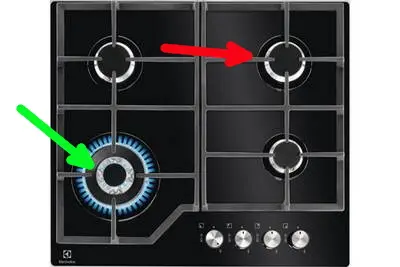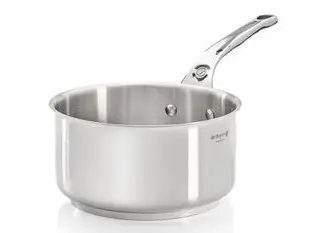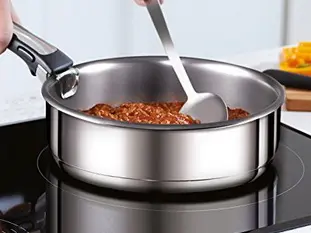This site uses only a few technical cookies necessary for its operation. By continuing to browse, you accept their use.
To find out more...
To find out more...
Thermal inertia or "out of the fire"

When you're cooking, you need a lot of heat to cook, and most of the time it's on the fire, literally if you're on gas, more indirectly if you're not.
An expression that comes up quite often is "Off the heat", but what does it really mean?
An expression that comes up quite often is "Off the heat", but what does it really mean?
11 K 4.6/5 (16 reviews)
Keywords for this post:CookingHeatInertiaThermalPanFireLast modified on: December 12th 2020
Thermal inertia or "out of the fire"
When it comes to saucepans (in the broadest sense of the word: saucepans, sauté pans, frying pans, etc.), you'll find the full range of quality, and therefore price, in the shops.
From the cheap, cheap stuff that's often lightweight, but won't last very long, to the rather chic, heavy, stainless steel pans that will last you a lifetime or more (yes, it's a bit weird to say and consider, but your pots and pans might just outlive you).
The quality saucepans I was talking about have a very thick bottom, around 1 cm of solid steel, which is welded to the pan itself.
The role of this bottom is thermal inertia, i.e. when you put it on the fire, the bottom "loads" with heat first, and separates the flame from the food being heated/cooked, which means that the contents of the pan take longer to heat up, but in the other direction, same inertia, it cools down less quickly.
So there's a "certain time" between the moment you turn off the heat, and the moment your preparation stops heating or cooking.
As a general rule, this is very practical: no sudden bursts of heat, less risk of burning, less sensitivity to false settings. It's not for nothing that all chefs' kitchens are equipped with these pans.
Note that this applies to both gas and induction, although induction is much smoother anyway (it seems to me).
Well, from all this, it's clear that you need to be very careful, especially if you're cooking a delicate food like fish, with the thermal inertia of your pans.
It's quite easy to overcook a food, without necessarily burning everything, because even though you've turned off the heat, it's still cooking a little.
That's why you'll find the expression "hors du feu" (off the heat) in many recipes, for example "hors du feu, ajoutez les œufs battus" (off the heat, add the beaten eggs), and it's to be applied strictly: remove your pan from the heat before continuing, otherwise, due to the thermal inertia of your pan + the residual heat of the stove (even if it's less with induction), you'll overcook and perhaps miss your recipe, which would be a great pity...
In practice, if you cook at the green arrow, "off the heat" is at the red arrow.
In short: When you come across the expression "off the heat" in a recipe, it's not just a matter of turning off the heat, it's also a matter of moving your pan away from the heat so as to stop cooking relatively quickly.
From the cheap, cheap stuff that's often lightweight, but won't last very long, to the rather chic, heavy, stainless steel pans that will last you a lifetime or more (yes, it's a bit weird to say and consider, but your pots and pans might just outlive you).

The quality saucepans I was talking about have a very thick bottom, around 1 cm of solid steel, which is welded to the pan itself.
The role of this bottom is thermal inertia, i.e. when you put it on the fire, the bottom "loads" with heat first, and separates the flame from the food being heated/cooked, which means that the contents of the pan take longer to heat up, but in the other direction, same inertia, it cools down less quickly.

So there's a "certain time" between the moment you turn off the heat, and the moment your preparation stops heating or cooking.
As a general rule, this is very practical: no sudden bursts of heat, less risk of burning, less sensitivity to false settings. It's not for nothing that all chefs' kitchens are equipped with these pans.
Note that this applies to both gas and induction, although induction is much smoother anyway (it seems to me).
Right, and?
Well, from all this, it's clear that you need to be very careful, especially if you're cooking a delicate food like fish, with the thermal inertia of your pans.
It's quite easy to overcook a food, without necessarily burning everything, because even though you've turned off the heat, it's still cooking a little.
That's why you'll find the expression "hors du feu" (off the heat) in many recipes, for example "hors du feu, ajoutez les œufs battus" (off the heat, add the beaten eggs), and it's to be applied strictly: remove your pan from the heat before continuing, otherwise, due to the thermal inertia of your pan + the residual heat of the stove (even if it's less with induction), you'll overcook and perhaps miss your recipe, which would be a great pity...

In practice, if you cook at the green arrow, "off the heat" is at the red arrow.
In short: When you come across the expression "off the heat" in a recipe, it's not just a matter of turning off the heat, it's also a matter of moving your pan away from the heat so as to stop cooking relatively quickly.
Lasts posts
Butter vs. grease
We often read in a recipe where a pastry is put into a mould that, just before pouring, the mould should be buttered or greased. But what's the difference between these 2 terms?December 1st 20252,2185
Getting out of the fridge early
Very often when you're cooking, you need to take food or preparations out of the fridge, to use them in the recipe in progress. There's nothing tricky about this: you just take them out of the fridge and use them, usually immediately, in the recipe. But is this really a good method?November 24th 20251,4695
Who's making the croissants?
When you look at a bakery from the outside, you naturally think that in the bakery, the bakers make the bread, and in the laboratory, the pastry chefs make the cakes. It's very often like that, with each of these professions having quite different ways of working, but sometimes there's also one...November 23th 20251,348
Oven height
When we put a dish or cake in the oven, we naturally tend to put it on the middle shelf, and that's what we usually do. But in some cases, this position and height can be a little tricky, so let's find out why.October 8th 20254,1725
The importance of sieving
In recipes that use a fine powder (flour, powdered sugar, etc.), you'll often see the advice to sift before using it. To sift is to pass the powder in question through a sieve (a very fine strainer) before incorporating it into your recipe. It's often advice, but is it really useful?September 3rd 20258,5253
Other pages you may also like
Sugar syrups
In cooking, and especially in pastry, we often use sugar syrups, a simple mixture of water and sugar in varying proportions. Here is a presentation of their differences. .January 17th 202312 K4.8
The march forward
When professionals get to work in their kitchen, lab or bakery, they are (if they are conscientious) very sensitive to hygiene and cleanliness. It is impossible for a good baker for example to do a day's work without regularly cleaning the table where he or she works, and it is even more...June 30th 202120 K5
Drawing a pattern in pastry
Often in the kitchen, in pastry-making, or in baking, we need to trace a pattern on a pastry. It's just a question of aesthetics but it has its effect after baking on a galette, pithiviers, pâté en croute (terrine in a pie crust), etc.May 23th 201936 K4.1
Soup vs. potage
It's true that we're finally coming out of winter as I write these lines, and that we'll all be making, no doubt, a little less soup and potages, but even if it's out of season, it really is a simple and delicious dish, which is one of the always easy answers to "What's for dinner this (Sunday)...April 9th 202211 K
Half milk, half cream
In a multitude of recipes, savoury or sweet, milk is used as the main ingredient, or at least as the main liquid ingredient. Milk is used instead of water, for example, because milk contains a proportion of fat, which adds roundness and softness to the recipe. This mellowness is very pleasant on...February 27th 20249,7355
Post a comment or question
Follow this page
If you are interested in this page, you can "follow" it, by entering your email address here. You will then receive a notification immediately each time the page is modified or a new comment is added. Please note that you will need to confirm this following.
Note: We'll never share your e-mail address with anyone else.
Alternatively: you can subscribe to the mailing list of cooling-ez.com , you will receive a e-mail for each new recipe published on the site.









